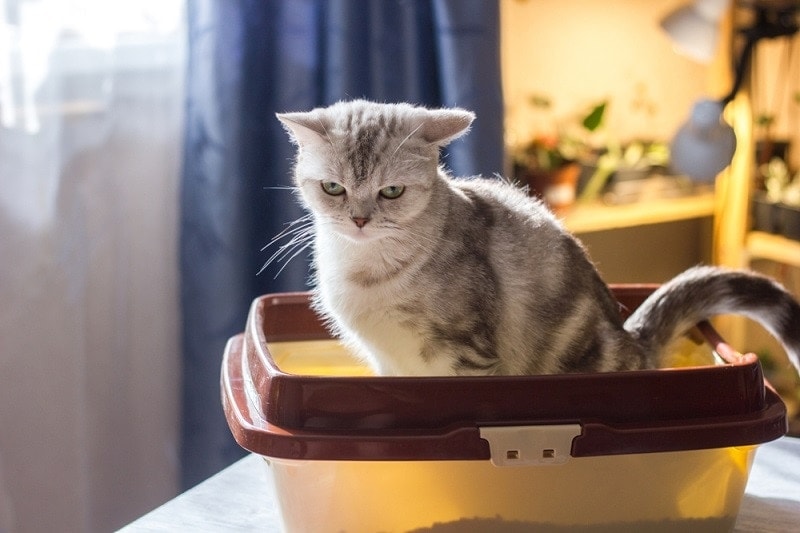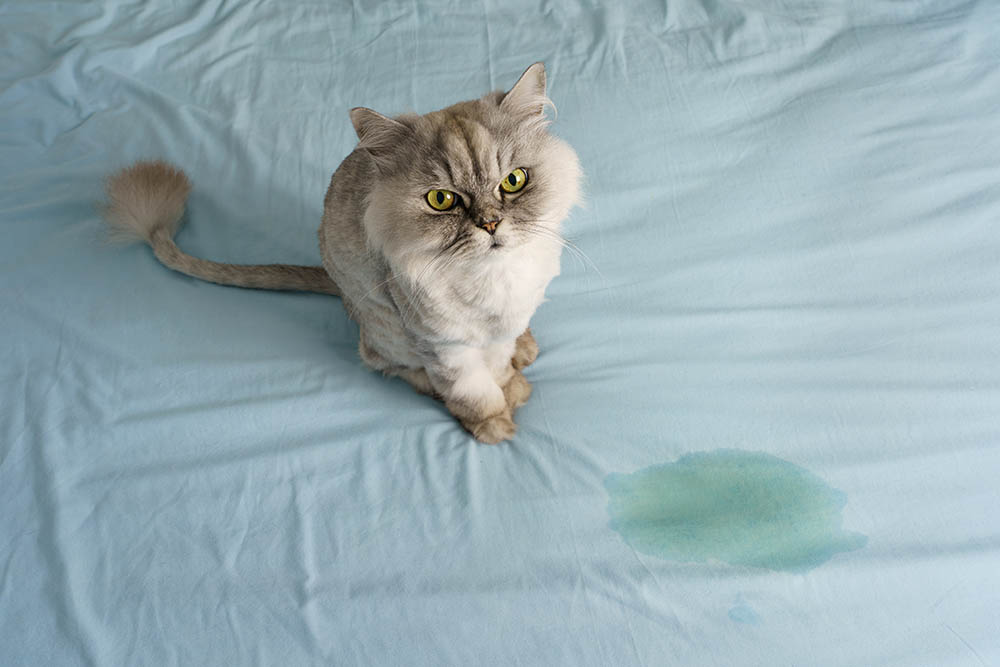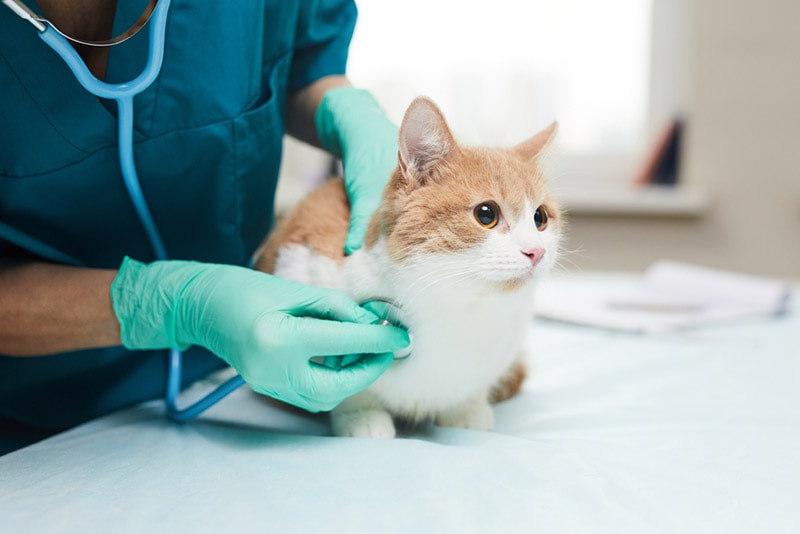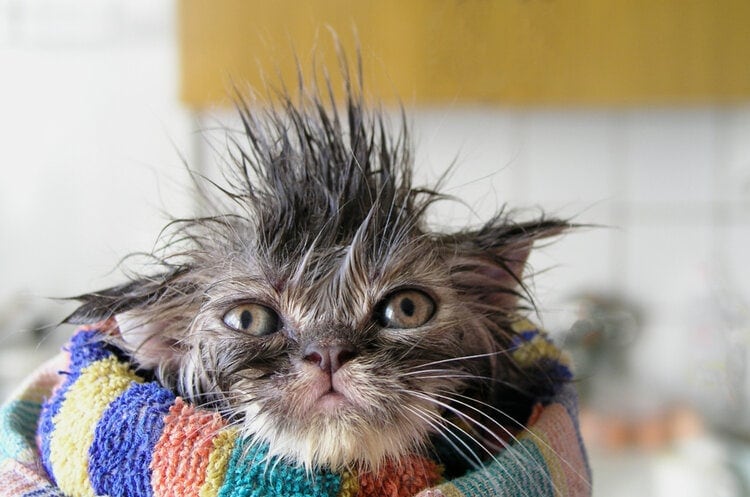I Found Blood in My Cat’s Urine: Vet Approved Advice & FAQs
Updated on

Seeing blood in your cat’s urine can be quite worrying. Many things could cause it, and maybe you aren’t sure where to start. It’s not normal for blood to be in a cat’s urine, so it is cause for alarm. However, most causes of blood in a cat’s urine are common and treatable.
However, you’ll typically need to go to the vet for treatment, as blood in your cat’s urine is often serious. Below, we’ve listed several common causes for bloody urine in cats and how to tell if you’re seeing blood.
What Does Blood in Cat Urine Look Like?
Blood in a cat’s urine can be hard to spot. However, multiple other signs can indicate something wrong with your cat’s urine. The most common sign is the cat having accidents or peeing outside their litter box. This is likely how you will find out there’s blood in the first place.
Changes in a cat’s urinating patterns can also point towards something wrong with your cat’s urinary tract. Sometimes this means they will either urinate more or less; other times clumps of urine may be larger than normal, or smaller. It just depends on what exactly is causing it.
Meowing or yowling while peeing can also be a sign, as it can indicate your cat is in pain.. Also, something is likely wrong if you notice that the urine smells different or is off-color.

The 3 Causes of Blood in Cat Urine
Many things can cause your cat to have blood in its urine. Most of these are fairly easy to treat, but some can cause great concern.
1. Urinary Tract Infections
Urinary tract infections, better known as UTIs, are an infection in a cat’s kidney, urethra, bladder, or ureter. These are all organs related to the process of urination, and an infection of any of these body parts can cause blood in a cat’s urine.
Other signs that your cat has a UTI can include weight loss, increased thirst, urinating more often, struggling to urinate, poor appetite, and a foul smell to the urine. Luckily, they are easily treated with some antibiotics, so a trip to the vet will be an easy way to take care of your cat.
2. Cystitis
Cystitis is another very common cause of blood in a cat’s urine. Cystitis by definition is inflammation in the bladder and urinary tract, and it goes by many names. These names include feline idiopathic cystitis (FIC), feline lower urinary tract disease (FLUTD), Feline urologic syndrome (FUS), and feline interstitial cystitis (FIC).
Treatment for this is not too complicated, though diagnosis can be tough. It commonly requires inspecting the cat’s urine and excluding multiple other problems, through urine cultures, x-rays or ultrasounds. Cystitis is treated through environmental enrichment and stress reduction, along with diet modification introducing or increasing canned wet food. This helps increase your cat’s hydration and water down their urine.

3. Urinary Stones and Crystals
Urinary stones or crystals in your cat’s urinary tract also cause blood in a cat’s urine. Crystals can form within your cat’s urethra, causing pain and, in male cats, even a complete blockage. These crystals in your cat’s urinary tract can be deadly if untreated.
A blockage in male cats could become fatal within 48 to 72 hours, so be sure to watch your cat for any signs that they may not be able to urinate due to a blockage.
Stones can also form due to these crystals. Stones can cause symptoms, including chronic or recurrent urinary tract infections and blood in the urine.
It can also cause a problem for the kidneys. It can create a kind of hydronephrosis, when urine cannot drain out of the kidneys, causing them to swell.
What Should I Do If I Find Blood in My Cat’s Urine?
If you find blood in your cat’s urine, you need to take them to a vet as soon as possible. The causes that could make blood appear in your cat’s urine can be life-threatening if left untreated. While most aren’t a medical emergency, they can easily become one if you don’t take them to the vet. Vets have medical supplies that can help rule out certain issues, allowing you to know exactly what is wrong with your cat.
An emergency animal clinic, or the vet, is very important to your cat’s recovery. Without the correct tools or knowledge, your cat’s symptoms may worsen due to a lack of treatment. Most causes aren’t life-threatening, but if left untreated, anything can get that bad.

Conclusion
Blood in a cat’s urine is a definite sign that something is wrong. Taking them to the vet as soon as possible is the best thing you can do. While some things that cause blood in your cat’s urine aren’t life-threatening or a cause for great concern, some can become a medical emergency if you don’t get treatment immediately.
There are many causes for a cat’s urine to have blood in it, including a urinary tract infection, cystitis, urinary crystals/stones, and many others. Without the correct materials or knowledge, you can’t diagnose them with something with 100% certainty like a vet can.
There are common causes for a cat to have blood in their urine, but there are also very hard-to-diagnose and rare causes, such as bladder cancer. This is why it’s important to take them to the vet.
Treatment of most of these issues includes medication, a change in diet, or surgery. This should be kept in mind when taking your cat to the vet.
See also:
Featured Image Credit: Sharaf Maksumov, Shutterstock














